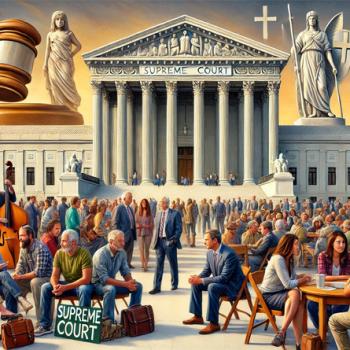Left Behind, pp. 461-465
In the seven pages remaining in this book there are six phone conversations, some pager and intercom action, a cab ride, another New York-Chicago flight, and the introduction of a new character who dominates a few pages, turns out not to matter much and goes away without affecting the story.
This last is Det. Sgt. Billy Cenni of New York’s finest. He is unnamed when we first meet him, just one of the indeterminate number of police and/or “security” to arrive in the U.N. conference room where Jonathan Stonagal and Global Viceregent and Emperor of Britannia Todd-Cothran are lying dead from a single bullet.
A plainclothesman asked questions. Buck headed him off. “You have enough eyewitnesses here. Let me leave you my card and you can call if you need me, hm?” The cop traded cards with him and Buck was permitted to leave.
To recap: Stonagal and T-C tried to have Buck killed. He was forced to fake his own death, racing across continents incognito to escape with his life. One week later, he encounters these men face to face for the first time. This meeting occurs behind closed doors and it ends with both of his enemies dead. No reason to keep Buck around for questioning then, hm?
So the world’s worst police detective is letting people leave the scene of the crime and thus the world’s worst reporter is able to flee from a still-unfolding story. The authors then provide a more detailed look at Buck’s journalistic M.O.:
Buck grabbed his bag and sprinted for a cab, rushing back to the office. He shut and locked his office door and began furiously banging out every detail of the story.
Based on this scene, here are some of the GIRAT’s tips for all you young reporters out there:
1. If you see news happening, run away as fast as possible.
2. Don’t talk to anyone.
3. Don’t take notes or record anything. It’s OK to carry around a big tape recorder, just make sure you never use it.*
4. Write in an otherwise empty, locked room without consulting notes. The whole story should exist only in your head — that’s where news comes from.
It’s not clear why Buck is in such a hurry here. He’s scurrying around like he works for WGW newsradio and he needs to air this story ASAP as a breaking news bulletin. But he actually works for Global Weekly, a magazine with a languid lead time and no way of publishing a fast-breaking story. In any case, Buck’s furious banging is interrupted by a phone call, the account of which begins with what may be the five least plausible words in this book:
He had produced several pages when he received a call from Stanton Bailey. The old man could hardly catch his breath between his demanding questions, not allowing Buck to answer.
“Where have you been? Why weren’t you at the press conference? Were you in there when Stonagal offed himself and took the Brit with him? You should have been here. …”
Statement! Two all. Game point. …
” … There’s prestige for us having you in there. How are you going to convince anybody you were in there when you didn’t show up for the press conference? Cameron, what’s the deal?
There’s a bit of a sequence-of-events problem here. Bailey is upset and asking about things he doesn’t know yet.
By the end of this chapter, Stanton Bailey will have talked to Steve Plank and to several U.N. officials and police/security officers who have all been mind-whammied into believing that Buck wasn’t “in there when Stonagal offed himself.” So eventually, after talking to those people, Bailey ought to be angrily demanding answers from his star reporter. But as far as he knows at this point, Buck was in the earlier meeting. Instead of asking the kinds of questions that would entail (“Are you alright?” “What did you see?”) Bailey seems to have already moved on to the kinds of questions he will want to be asking later, such as “How are you going to convince anybody you were in there?”
It’s not that hard to imagine reasons why Buck might have skipped the press conference. He might have been busily interviewing the other people with him in the room when the supposed suicide/murder took place. He might have tracked down an interview with Mrs. Todd-Cothran. There are dozens of different ways he might have been racing to move the story forward while his colleagues were all playing catch up at the press conference, scrambling to get the second-hand version of the story Buck just witnessed first-hand.
Once Bailey learned Buck hadn’t been doing any of those things, either, then he might be upset that Buck had missed the press conference, but instead he jumps right in with this “Why weren’t you there?” questioning because — like the authors — he knows ahead of time where this chapter is headed.
That this press conference has already taken place is also remarkable. The police apparently have already finished their investigation of the crime scene, completing their interviews with more than a dozen eerily repetitive and obviously rehearsed eyewitnesses,** wrapping up everything so tidily and quickly that Nicolae was free to go ahead with his presser on schedule, pronouncing his evidently brief RBO and ordering the newly designed flags of the new One World Government to be flown at half-staff while he takes advantage of the paid bereavement leave outlined in the OWG Personnel Handbook. And all of that took place in the time it took Buck to rush back to the office and type up a few pages.
“I hurried back here to get the story into the system,” Buck explains. He didn’t have time to finish getting the story because he was too busy already writing it. Bailey doesn’t care about the story, as he’s already said, he’s concerned with “prestige”:
“Don’t you have an exclusive with Carpathia now?”
Yes, it’s another post-press conference “exclusive.” Buck is a master at lining up these exclusive interviews right after his interviewees have answered questions from the entire press corps, Nightline and People magazine.
Buck had forgotten that, and Plank hadn’t reconfirmed it. What was he supposed to do about that? He prayed but sensed no leading. How he needed to talk to Bruce or Chloe or even Captain Steele! “I’ll call Steve and see,” he said.
Buck has been a born-again RTC for less than half a day but he’s already completely absorbed the native idiom. “He prayed but sensed no leading” conveys a raft of beliefs about the meaning, nature and practice of prayer that Buck shouldn’t have any experience with or knowledge of. Yet as soon as the “transaction” occurs, the moment he is saved, he emerges full-grown with all of the cultural tics and learned piety of someone who had lived for decades in a particular kind of evangelical church.
That particular kind of evangelical church no longer exists in the world of Left Behind. It was whisked off the planet along with nearly every person who spoke its lingo and adhered to its forms of piety. Yet whenever anyone in this post-Rapture world converts, they instantly begin talking about “sensing the Lord’s leading.” The specific shape and form of piety in this one culture seems to be for the authors inextricably and indistinguishably intermixed with the meaning and substance of the gospel. They seem unable to imagine a Christian who does not pray, worship and speak exactly as they do.
There’s a reason that Pentecost and the Great Commission are emphatically cross-cultural. If everyone you know who shares your faith also shares your culture then you end up with no way of knowing which is which, no way of knowing where the one stops and the other begins, no way of knowing the ways in which they have or haven’t been allowed to influence one another.
Anyway, Buck is understandably not relishing the idea of a one-on-one session with the man he just watched kill two people and then brainwash a dozen others:
Should he allow himself to be in a room alone with Carpathia? And if he did, should he pretend to be under his mind control as everyone else seemed to be? … Would he always be able to resist the influence with God’s help? He didn’t know.
So Buck calls Steve (actually, he calls Steve’s pager and then Steve calls him back, just to get a little more telephony into the story) and asks whether or not the interview is still on. Here we arrive at the part of the story that Stanton Bailey already seems to have known:
“You heard what happened and you want an exclusive?”
“Heard? I was there, Steve.”
“Well, if you were here, then you probably know what happened before the press conference.”
“Steve! I saw it with my own eyes.”
“You’re not following me, Buck. I’m saying if you were here for the press conference, you heard about the Stonagal suicide in the preliminary meeting, the one you were supposed to come to.”
Buck didn’t know what to say. “You saw me there, Steve.”
“I didn’t even see you at the press conference.”
“I wasn’t at the press conference, Steve, but I was in the room when Stonagal and Todd-Cothran died.”
“I don’t have time for this, Buck. It’s not funny. …”
The problem is that it is funny. Jenkins is shooting for a frightening sense of bewildering disorientation — something like the prose equivalent of Bernard Hermann’s score for Vertigo — but he ends up with something more along the lines of “Who’s on First?”
The authors themselves seem far more disoriented than Buck does. Granted, this section calls for a tricky bit of writing — conveying that two characters hold such wholly unreconcilable perceptions that they are scarcely able to communicate. But it takes Buck a bit too long to figure out what everyone is telling him, and even then he doesn’t offer much in his own defense:
Steve hung up on him. Marge buzzed and said the boss was on the line again. “What’s the deal with you not even going to that meeting?” Bailey said.
“I was there! You saw me go in!”
“Yeah, I saw you. You were that close. What did you do, find something more important to do? You got some fast talking to do, Cameron!”
“I’m telling you I was there! I’ll show you my credentials.”
“I just checked the credential list, and you’re not on it.”
“Of course I’m on it. I’ll show ’em to you.”
“Your name’s there, I’m saying, but it’s not checked off.”
“Mr. Bailey, I’m looking at my credentials right now. They’re in my hand.”
“Your credentials don’t mean dirt if you didn’t use ’em, Cameron.”
This business with the credentials is beside the point. Say you’re arguing with a friend who doubts you actually went to a concert or a ballgame. You wouldn’t bother showing her the tickets as proof because, as Bailey points out, your having the tickets wouldn’t prove you actually used them. So instead you would try to convince your friend by telling her what you saw at the concert or the game — things you couldn’t have seen if you hadn’t actually been there. Buck never does this, so Bailey keeps at him:
“I just talked to three, four people who were there, including a U.N. guard and Carpathia’s personal assistant, not to mention Plank. None of them saw you, you weren’t there.”
By this point Buck is so caught up in the Duck-Season/Rabbit-Season back and forth over whether or not he was actually at the meeting that he completely misses the repercussions of what Stanton Bailey is telling him: Everyone else who was in that room has been mind-whammied into believing that Buck was never there.
And it’s not just Steve, Hattie and the others from the room. It’s bigger and more widespread than that:
“A cop saw me!” Buck insists to his boss. “We traded cards!”
He decides to track down Det. Sgt. Billy Cenni — he’ll vouch that Buck was really there. That’ll show ’em.
So he calls the precinct and asks for Cenni. He tries multiple pronunciations. He spells the name out for them. He has them look in the directory for the entire department. This is recounted in a page and a half of unwelcome detail, finally arriving at this:
“Personnel says there is nobody in the New York Police Department named Cenni, and there never has been.”
And that, in turn, leads Buck to this astonishingly dim conclusion:
All Buck could do now was try to convince Stanton Bailey.
Yeah, because that’s what’s important here — that he “convince Stanton Bailey” that he was really in the room.
Buck has just learned that the Antichrist has singled him out, brainwashing dozens of others into forgetting that he had ever been there. Why would he have wiped out every trace of Buck’s presence unless he had come to suspect that Buck was onto his secret? When Buck left that room, he was sure that Nicolae had believed that he had been successfully reprogrammed, but now that Nicolae has chosen to mind-whammy him right out of the picture it would seem that, somehow, the Antichrist had figured out that Buck hadn’t been fooled. And now Nicolae apparently has henchmen posing as police. Who knows where else they may have infiltrated. Nicolae’s spies could be anywhere. They could be everywhere.
That all sounds a bit paranoid, of course, but a bit of paranoia would seem to be called for when one is dealing with the Antichrist, a massive conspiracy and mysterious strangers passing themselves off as the cops. Yet, weirdly, Buck never entertains any such thoughts. Nor does he consider their flipside — that maybe he is just being paranoid, or maybe he really is losing it.
With all that Buck has just seen and heard, it would seem reasonable for him to question whether or not he was still reasonable. He ought to at least consider the possibility that he’s losing his mind.
This would be, at this point, a plausible and rational hypothesis. The entire world seems to be bearing witness to a version of events that contradicts what he believes he has just seen and heard. That seems to leave two possibilities: Either everyone else has gone mad and he alone has kept his sanity, or else the other way around. The latter possibility is simpler, and thus likelier,*** so it at least ought to be considered as a possibility.
Yet neither Buck nor the authors give this likely possibility a second thought. And because they never give it serious consideration, they never definitively rule it out. By refusing even the slightest doubts about his own sanity, Buck comes across as insanely confident in his own certainty. This, sadly, is what the authors apparently think it means to have “faith.”
– – – – – – – – – – – –
* Seriously, Buck had his bag with the tape recorder in it right there in the room where Nicolae was working his mojo. The authors had him leave it, unused, in the corner. Thousands of different plot possibilities would arise from having had Buck surreptitiously tape-recording the entire murder and mojo and every one of those possibilities would have been much, much cooler than leaving the @%#$ bag unused and untouched in the corner of the room.
** Between the implausibly similar and practiced accounts of these witnesses and the unlikely description of the crime itself — with the elderly Stonagal racing around the room faster than the able-bodied T-C could move to safety — the detectives’ BS-meter should be spiking in the red. Nicolae, of course, must have worked his mojo on these investigators, otherwise, by the twelfth rendition of the witnesses’ identical account, they’d have to be suspecting some kind of Orient Express conspiracy in which everyone in the room was somehow complicit in the deaths of these two men.
*** It’d be fun to rework the whole book in a Shutter Island/”Normal Again” vein, with Nicolae Carpathia turning out to be Buck/Rayford’s psychologist desperately working to save him …
















